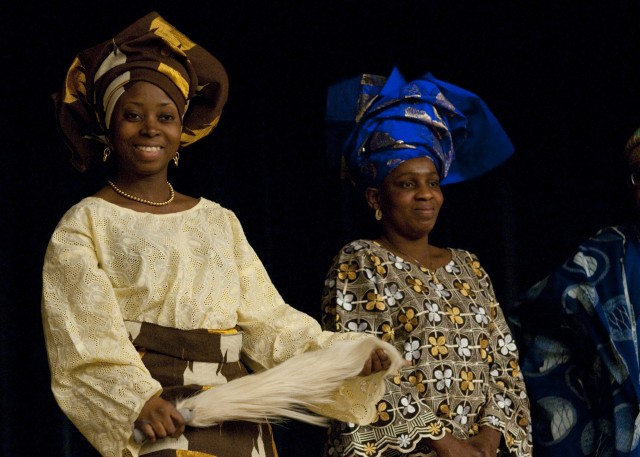FORT BRAGG, N.C. - February marks the annual celebration of diversity and acceptance. Together, the XVIII Airborne Corps, U.S. Army Special Operations Command and Team Bragg Equal Opportunities representatives put together a unique presentation about African-Americans and the Civil War in honor of National Black History Month, Feb. 23.
The presentation included remarks by Maj. Gen. Rodney Anderson, XVIII Airborne Corps' deputy commanding general, skits, poems and dance performances.
The story of the heroic Cpl. Andrew J. Smith, a black Soldier who was awarded the Medal of Honor 137 years after his courageous act during the Civil War, was the main focus of Anderson's remarks.
Smith was born into slavery. His owner joined the Confederate military when the Civil War began and intended for Smith to fight with him. Smith and another slave ran away and walked 25 miles to join the Union Army and fight for what they believed in.
During his time in the Army, Smith served with the 55th Massachusetts Volunteer Infantry and earned the Medal of Honor during the bloody charge of the Battle of Honey Hill in November of 1864.
According to the medal's citation, "in the late afternoon, as the 55th Regiment pursued enemy skirmishers and conducted a running fight, they ran into a swampy area backed by a rise where the Confederate Army awaited ... Forced into a narrow gorge crossing a swamp in the face of the enemy position, the 55th's color-sergeant was killed by an exploding shell, and Corporal Smith took the Regimental colors from his hand and carried them through heavy grape and canister fire.
"Although half of the officers and a third of the enlisted men engaged in the fight were killed or wounded, Corporal Smith continued to expose himself to enemy fire by carrying the colors throughout the battle. Through his actions, the regimental colors of the 55th Infantry Regiment were not lost to the enemy," said Anderson of the medal citation.
President Clinton awarded the Medal of Honor to Smith's descendent 137 years later in 2001.
Anderson explained the importance of a unit's colors and the honor it was to protect it from the enemy. Anderson also explained that black Soldiers in past wars have fought alongside others for freedoms even though they themselves didn't get the privilage of enjoying.
"Freedom isn't free, many of America's sons and daughters are deployed as we speak," said Anderson. "Why' Because they protect this country in which they believe in so much. Words are inadequate to recall the pain and brutality of slavery - freedom isn't free. Americans of all colors have fought for the freedoms of all."
Following Anderson's remarks, Soldiers and civilians offered a "Who am I" presentation that gave acknowledgement to many black leaders. Among those recognized were Cripus Attucks, who was the first American killed at the start of the Revolutionary War, at the Boston Massacre. Harriet Tubman was recognized for her acts of bravery helping slaves to freedom through the underground railroad.
The first female African-American to serve in the Army, Cathay Williams who posed as a male Soldier with the Buffalo Soldiers unit, was also recognized as well as the first black Special Forces general in the Army, Brig. Gen. (retired) Remo Butler.
The cast from the play, Dateline: Greensboro (Antony Bishop, Dashawn Bryon, Andra Hale, and Ken Keaton) acted out a scene about the civil rights sit-ins in Greensboro, N.C. Raqi Barnett, an Army spouse and director of the play, also read and acted out poems by Langston Hughes and Paul Laurence Dunbar.
Closing the presentation was the Yoruba Descendants Union of Fayetteville who talked about their country, their culture, clothing and danced for the audience.
"Freedom is the blood, sweat, tears and lives given of those before us," said Anderson. "We can learn a lot from Smith's actions - he kept the colors moving forward. We too must keep moving forward with our resilience and move forward to our future."


Social Sharing